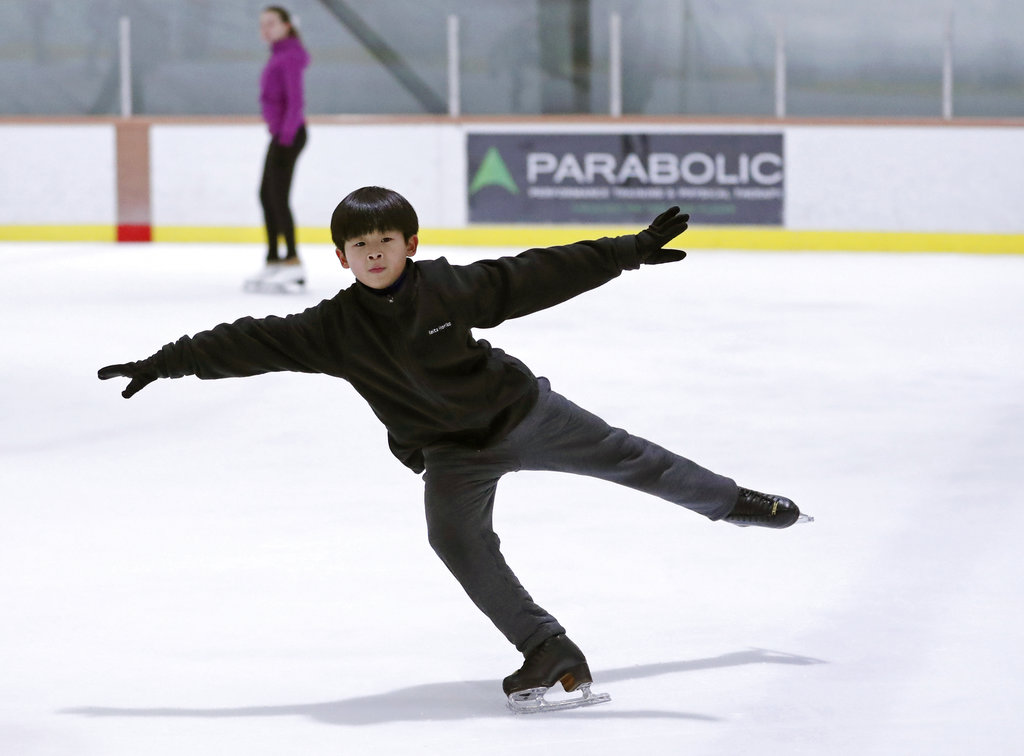
Keita Horiko, the 10-year-old U.S. Figure Skating juvenile boys champion, practices during his second workout of the day Thursday, Feb. 8, 2018, at the Ice House in Hackensack, N.J. With Asian-Americans making up half of the U.S. figure skating team at the Pyeongchang Olympics, talented youngsters like Horiko can hope to realize dreams of one day being on the ice at the international as they have plenty of role models to emulate. (AP Photo/Kathy Willens)
HACKENSACK, N.J. — Keita Horiko glided across the rink at the Ice House, picking up speed as he attempted a jump — and sprawled in a fall as he came back down.
Unfazed, the 10-year-old U.S. Figure Skating juvenile boys champion got up and started skating again. His older brother, 13-year-old Yuki, also was on the ice, practicing his own moves as they wound down their second practice of the day before heading home to Manhattan and doing it all again the next day.
They’ve got Olympic-size dreams, and when they watch figure skating at the Pyeongchang Games, they’ve got plenty of role models — a history-making U.S. figure skating team where half of the 14 members are Asian-American.
“It’s very inspiring and it makes you think, I want to be like them,” Keita said.
While there have been Asian-American figure skaters representing the United States at past Olympics — the most high-profile being gold medalist Kristi Yamaguchi in 1992 and silver and bronze medalist Michelle Kwan in 1998 and 2002 — there never has been anything like this.
For the women, there’s 24-year-old Mirai Nagasu and 18-year-old Karen Chen; on the men’s side, 18-year-old Nathan Chen and 17-year-old Vincent Zhou; among the ice dancers, sibling pair Alex Shibutani, 26, and Maia Shibutani, 23, and Madison Chock, 25.
It’s a heady moment, especially because Asian-Americans as a minority group have long faced stereotypes of being more about books and brains than anything else.
“I think it’s supercool and exciting,” said Mai Hoang Parmentier, 35, of Yakima, Washington, who got into watching skating when she saw Yamaguchi compete.
“For me growing up you had the stereotype of oh, Asians are good at math or academia or art or music,” she said. “I just like the idea that my daughter can see that she doesn’t have to be pigeonholed, that she can actually be good at sports.”
Ryan Morris, 28, of Berkeley, California, agreed. The skating fan planned on making sure his young nieces and nephew watched it with him.
“They’re going to see in the most important sport in the Winter Olympics … people who look like them,” he said. “It’s a good feeling.”
Olympian Scott Hamilton said Yamaguchi’s and Kwan’s not only skating on a world stage but winning was likely an impetus for a younger generation of Asian-Americans, and their parents, even to consider it.
“A lot of it is seeing a sport and seeing others be successful and saying, I want to do that, and that’s what you need,” he said. “Winning really creates interest.”
There’s already been some success — skating in the team event, Nagasu became the first American woman to complete a triple axel in the Olympics. That led to some controversy when Bari Weiss, an op-ed writer for The New York Times, tweeted about the feat with the words, “Immigrants: They get the job done.” Nagasu was born in California, and the since-deleted tweet was criticized by some who said it touched on Asian-American concerns about continually being assumed to be foreigners.
Even that has echoes in previous Olympics, as in 1998, when a headline after American Tara Lipinski won the gold medal read, “American beats out Kwan.” Kwan was born and raised in California.
In this year’s games, much of the hoopla around possibly winning has focused on Nathan Chen in particular.
The Salt Lake City, Utah, native, who predicted as a 10-year-old novice champion that he would be at the 2018 Olympics, has been showcased as an athlete to watch at these games because of his athleticism and multiple quadruple jumps. He is considered a front-runner in the individual men’s event, even though he got off to a rough start by finishing fourth in the men’s short program for the team skating event after an uncharacteristic fall during a triple axel.
That Asian-Americans are being represented on the men’s side as well as the women’s is important, said Phil Yu, who writes about pop culture and other subjects on his Angry Asian Man blog.
Chen’s overall presence and success “is a powerful statement for Asian-American men who have generally had this stereotype hang over them of being not athletic, not expressive,” he said.
“To have someone like Nathan Chen excel, not only excel but blow all these other people out of the water, it’s a powerful thing,” Yu said.
It certainly is for Yuki Horiko. Seeing someone Asian-American like him go after Olympic gold “gives me more confidence” for his own hopes, the 13-year-old said.
“If he can do it, maybe I can do it.”